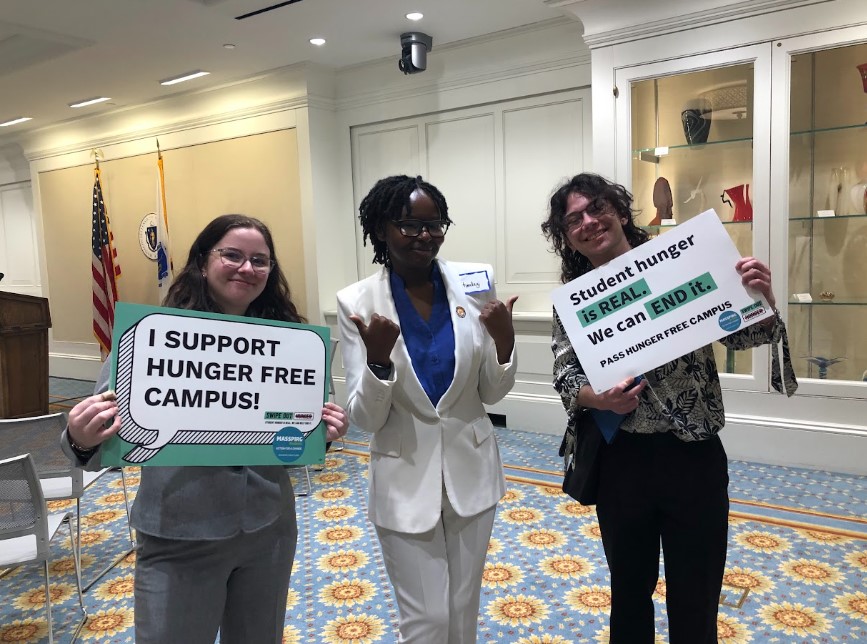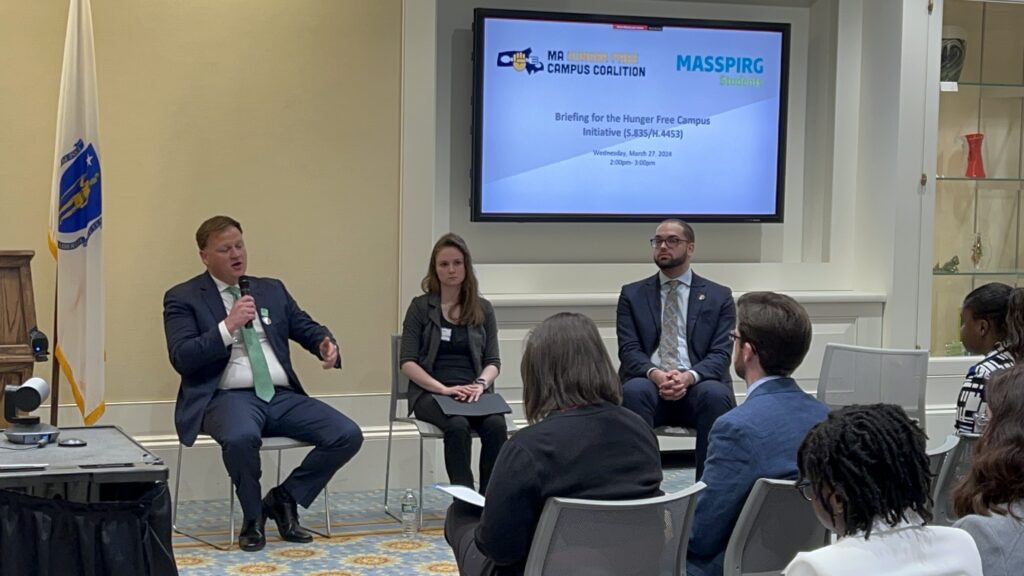Boston, MA (March 28, 2024) – Yesterday, nearly 100 students, campus leaders, and advocates from across the state, convened by the MA Hunger Free Campus Coalition and MASSPIRG Students, joined for a briefing and advocacy day in support of ending hunger on college campuses.
As 37 percent of public university students in Massachusetts face food insecurity, advocates uplifted the challenges that too many students face from not being able to afford food and the urgent need for legislation and funding to address these basic needs. The event focused on investing in student wellbeing and building the Commonwealth’s future workforce by removing equitable access to food as a barrier to higher education for students at community colleges, public universities, and minority-serving institutions across Massachusetts.
The briefing centered the voices of students experiencing food insecurity on campus and basic needs staff from UMass Lowell, Ben Franklin Cummings Technical Institute, and Springfield Technical Community College, who shared about the impact that previous funding for the initiative has made.

MASSPIRG Student Advocates at the Hunger Free Campus Initiative Briefing and Advocacy Day.
“An investment in the Hunger Free Campus Initiative is an investment in the future of the Commonwealth. The learners of today are the leaders of tomorrow, and if those students are wondering where their next meal is going to come from, it can be exceptionally difficult to focus on their studies,” Remarked Sean Simonini, MASSPIRG Students Vice Chair and UMass Lowell Student Leader. “That is why MASSPIRG Students are proud to join the fight to end hunger on college campuses.”
Community college enrollment is up 44% this semester as compared to this time last year, thanks to the Healey-Driscoll administration and legislature’s recent investments including MassReconnect, MassGrant Plus, and Tuition Equity. “Food security resources are critical to ensure that college students across the state–our future health care workers, elected officials, educators– can take advantage of the resources the state has committed to higher ed, focus on their schoolwork, and succeed,” noted Kate Adams, GBFB Public Policy Manager and co-lead on the HFCC. “Right now, too many students’ basic needs are not being met.”
Hunger-Free Campus Initiative bill sponsors State Senator Joan Lovely (D-Salem), State Representative Mindy Domb (D-Amherst), and State Representative Andy Vargas (D-Haverhill) were featured in the speaking program. Representative Domb remarked, “As we saw in passing School Meals for All, hungry students can’t learn. That includes college students. We know food insecurity on campus is growing, and it undermines our shared goals. We have to make sure their basic needs are met.”
Marissa Vaillencourt, North Shore Community College Student Trustee, spoke of her own challenges affording healthy food. “I’m on campus from 8am to 5pm. Most days, I’m just eating food from the vending machine. I love the cafeteria food, but spending money on it every day is a lot for me.”
“This is the first time we were able to have a full-time staff member addressing food insecurity needs thanks to this funding,” remarked Michael Hannigan, Greenfield Community College Student Trustee. “Without those resources on campus, many more students than you might think would go hungry.”

A panel of student leaders discuss hunger on college campuses.
The advocates urged the legislature to include $2 million in the FY25 state budget to fund the Hunger Free Campus Initiative, and to pass An Act Establishing the MA Hunger-Free Campus Initiative (S.835 / H.4453). This legislation would fund anti-hunger resources across MA college campuses such as food pantries, educational resources around SNAP and provide a single point of contact for hunger needs on campuses.
Over the past two years, the Hunger-Free Campus pilot program utilizing ARPA funds has been a rousing success on 27 campuses, benefiting thousands of low-income students. From expanding cultural food options at Middlesex Community College, to enrolling eligible students in SNAP benefits at UMass Boston and pulling federal funds into the Commonwealth, to increasing access to meals for homeless students during breaks at Salem State University, the investment in the Hunger-Free Campus Initiative is already making a difference for our students, supporting the next generation of Massachusetts’ workforce.
“This is also about an effective use of tax dollars that we’re already investing in higher ed –we can’t have that go to waste because college students are hungry,” said Representative Vargas.
The coalition is co-led by The Greater Boston Food Bank, the Food Bank of Western Massachusetts and the Mass Law Reform Institute with a strong partnership with MASSPRIG Students, a student-led network of campus organizers for positive change; and seeks to promote food access through awareness, best-practice sharing and legislative action among college students at two- and four-year public higher education institutions.
To learn more about the MA Hunger Free Campus initiative, visit www.mahungerfreecampus.org.